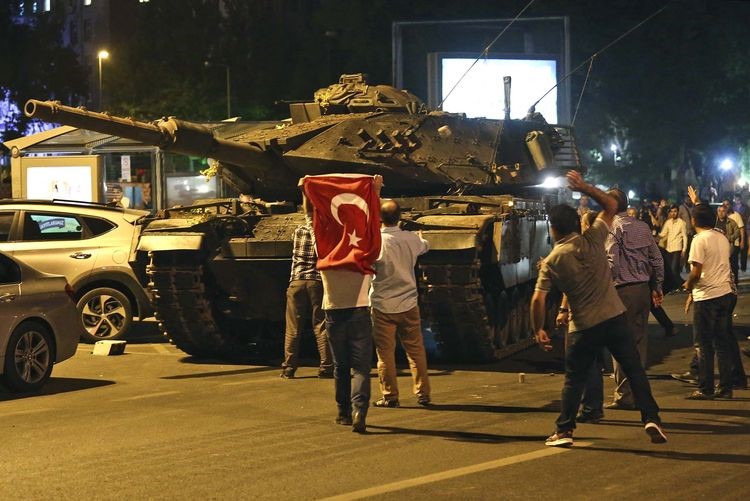
From a distance, there is a risk of misunderstanding: Turkey is making a strong voice, both diplomatically and militarily, like a poker player who constantly picks up without ever stopping. The reality, however, is that Erdoğan is a tired player who has drained his country economically and is now not only increasing the level of repressive violence of his teams, but no longer knows what else to do. And then suddenly, the framework of his alliances in the Middle East changes: from protector of Palestine and friend of Iran, he becomes the companion of the Arab monarchies, the Egyptian dictatorship and the Israeli government, which question the global geopolitical balance for several years because they threaten Qatar, Gaza, the Muslim Brotherhood and anyone who opposes the wishes of Mohammed bin Zayed Al-Nahyan.
The scandalous display of chauvinism that the Turkish dictator showed after the recent meeting with the leaders of the European Union (he left President Ursula Von der Leyen without a chair[1]) is only the umpteenth sign of the strategy of the Turkish regime: agreements to ignore, be loud, intimidate militarily and diplomatically, show no respect to anyone – whether Turkish or foreign. For this reason, Erdoğan’s Turkey has (deliberately) become a constant threat to international stability and peace and an unbearable hammer for the population, who cannot even hope for outside help.
Since the regime is an autocracy funded by a criminal division of all national assets – causing serious discontent even among original Erdoğan supporters – the only hope is that the dictator will die (he is only 66 years old) or that the he economy is collapsing which also shakes the loyalty of the army. The president, who has shown a profound inability to run the country during the years of his rule, seems to be dancing almost on the edge of the ravine – not just between peace and war, as evidenced by his military’s involvement in the Azerbaijani invasion of Nagorno-Karabakh, but also between bankruptcy and survival of the economic system.
Today, we take stock of the situation in this country, its inability to live with the democratic world, its betrayal of the memory of the father of the country, Mustafa Kemal Atatürk, his attempted genocide against the Kurdish people, but above all not oppression only on freedom, but also before information: bad news being prohibited, we can only talk about sport in Turkey today, and even in this case with great caution.
The myth of a self-made man
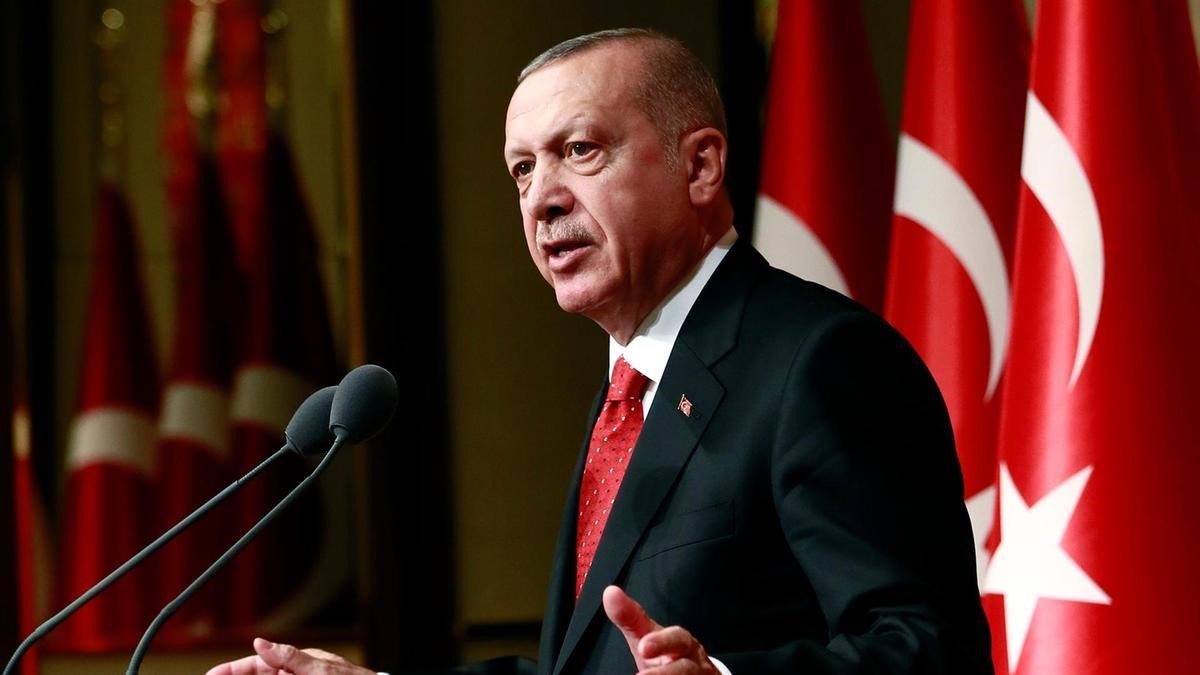
As in all autocratic regimes, that of Recep Tayyip Erdoğan requires a solid construction of the myth: the dictator was born in Istanbul on February 26, 1954, but spent his childhood in Rize, the capital of the province of Merkez, on the coast of Black Sea (his father was in the Coast Guard) and returned to Istanbul at the age of thirteen, where he made a living selling lemonade and sesame seeds on the streets[2] and attending a Muslim school that gave him would open a religious career[3]. But his real vocation is to be a footballer: he is called Imam Beckenbauer, and his career bordering on professionalism will last 16 years[4].
In these years of revolutions and counter-revolutions, the young Tayyip decides to take care of the rescue of his people[5]. For this reason (says his autobiography), he left religious school and studied economics at the University of Marmara[6]. It is a pity that this university was not open by the time of Erdoğan’s graduation …[7] There is no nonsense to lie, as the Turkish constitution requires a degree as a prerequisite for the exercise of the office of president, and it is probable that the dictator never succeeded[8].
He made a career in politics through his extremism in the National Union of Turkish Students (an anti-communist action group)[9] and through his work as a playwright and actor in “Maskomya” (1974), a comedy that depicts the Judaism and Communism as the embodiment of evil[10]. Two years later, he was elected head of the youth department of the National Salvation Party (MSP, Millî Selâmet Partisi)[11], which precisely proposed pro-Islamic nationalism defeated by the crisis of World War I and the secularization of the state by Atatürk[12].
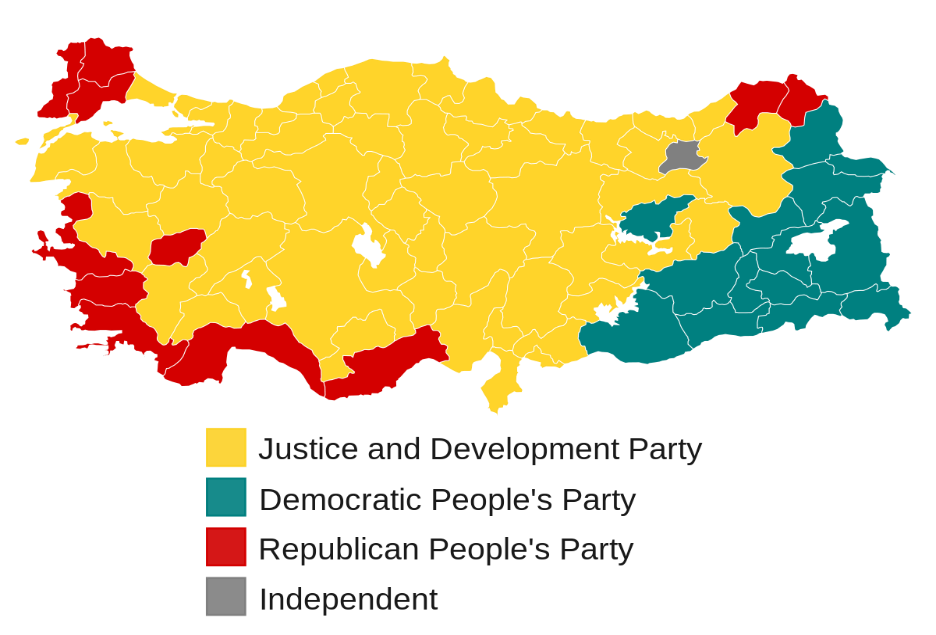
Map showing the vote of the 81 provincial capitals of Turkey in the 2002 legislative elections
In September 1980, following riots in major cities, there was a military coup in which about 5,000 people were killed[13]. The MSP is dissolved along with the other parties and its founder, Necmettin Erbakan, Erdoğan’s mentor, is prosecuted for violating the ban on the use of religion for political ends[14]. He is not alone: in one week, a blacklist of 1,683,000 citizens is drawn up, 650,000 are arrested, 338,000 have their passports confiscated, 14,000 are deprived of their nationality and expelled, around 30,000 flee to abroad, 3,854 teachers are excluded from schools and universities[15]. There are 50 death sentences, but it is impossible to track the actual number of deaths. The use of torture is systematic: at least 179 people are officially killed, hundreds more die in suspicious situations, traces of a few thousand are lost forever[16].
As parties were re-authorized in 1983, MSP activists rallied in the newborn Refah Partisi, led by Ahmet Tekdal, who rose from election to election from 4.8% in 1984[17] to 17.88 % in 1991[18] – and 1994 with Erdoğan as candidate, we won the city of Istanbul and received the mayor with 25.19% of the vote[19]. The following year, thanks to a network of religious alliances, Refah won the national elections for the first time[20]: a shocking result for the secular parties which, in agreement with the army, banned Refah[21].
The episode goes down in history as the “postmodern coup”, a coup in which not a single shot is fired[22]. Erdoğan is in trouble after reading a poem in public: “Mosques are our barracks, domes are our helmets, minarets are our bayonets and the faithful are our soldiers”. He was charged with inciting religious hatred, had to resign his post as mayor, and served four months in prison – a martyrdom, as propaganda later described[23].
Erdoğan was released from prison in 2001 and founded the Justice and Development Party (AKP Adalet ve Kalkınma Partisi), which won 34.2% of the vote in the 2002 elections and won 363 of the 550 seats in parliament[24]: it is the first party to join a majority Islamic vocation since 1923[25]. AKP co-founder Abdullah Gül is elected Prime Minister. In 2003, the government made a constitutional amendment that lifted Erdoğan’s conviction and paved the way for him to appoint Turkey’s twelfth prime minister[26] in a government in which Abdullah Gül became foreign minister[27]. The international diplomatic scene takes note of this with great concern and accuses it of having links with jihadist terrorism[28].
Cyprus and the U-turn to Europe
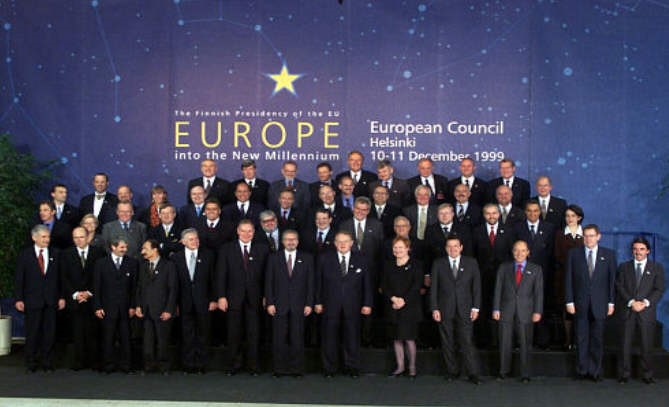
December 11, 1999: The Helsinki European Council welcomes Turkey as a candidate for the EU[29]
The new government inherits a country in deep economic and political crisis for which it is necessary to find new internal balances and to bring together international investors in order to regain its credibility[30]. A country which, despite the ACP agreement, saw in the European Union a great hope for future prosperity and stability. However, Erdoğan got off to a bad start: politicizing banking control, energy and telecommunications, cutting 12,000 public sector jobs and vertically increasing military spending[31]. The only concession: it is claimed that there will no longer be a place in the AKP for fundamentalist Islam, but only an Islamism which is integrated into modernity and the free market to come closer to the European Union[32].
Erdoğan initially promises the gradual rehabilitation of moderate Islam, the integration of the Kurdish people[33], the opening of schools, the army and the parliament for women who wear the veil[34]. These measures are counterbalanced by severe restrictions on alcohol sales, anti-contraceptive and anti-gender measures, which reaffirm that men and women cannot be treated equally[35].
The policy of rapprochement with the European Union and the liberalization of the markets are producing astonishing results: between 2002 and 2008, the Turkish economy recorded an average annual growth of 7.2%[36]. During the 2008 global crisis, Erdoğan’s government was hit like everyone else, but after a year the economy picked up again with growth of 8.8% in 2010 and 9.2% in 2011[37]. The success is the fruit of a season of reforms initiated by the Minister of the Economy Kemal Derviş: reform of the banking system by setting up a rescue fund for banks in difficulty, introduction of a rate system floating exchange rate, lifting restrictions on foreign capital inflows, thereby strengthening fiscal discipline, increasing central bank independence and stabilized inflation[38].
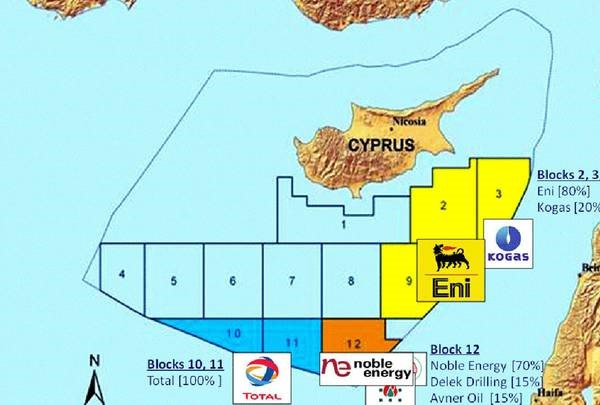
Map of hydrocarbon exploration in the exclusive economic zone of Cyprus[39]
But the European Union demands a lot in return, especially the real implementation of the promises made to secular society (which is also expressed through the imposition of the veil), the protection of the rights of Kurds and other minorities, effective implementation of human rights reforms, a new role for women and the military[40]. But even if the Turkish government takes important steps forward, which were recognized by the European Council of October 2005[41], the clause to get the Turks out of Cyprus will block everything[42]. Nothing to do: Erdoğan does not want to lose face, he rejects the agreement and also begins with warships to occupy the Mediterranean in a threatening manner[43].
The Turkish invasion of July 1974 led to a situation condemned by the United Nations Security Council in 1983: the island was divided into two: Cyprus, which belongs to the EU, and the Turkish Republic of Northern Cyprus, which besieges 37% of the island[44]. and is recognized only by Turkey[45]. Nicosia is divided into two parts by an area controlled by the United Nations (the so-called buffer zone)[46]. Reunification efforts have been unsuccessful[47], especially after the discovery of natural gas in the Eastern Mediterranean (2011)[48], which Cypriots and Turks claim to be theirs.
In May 2019, Turkey sent a ship to explore the seabed off the northern coast of Cyprus: Nicosia ratified the United Nations Convention on the Law of the Sea[49], defined territorial waters – and these are Greek waters: the European Union responds by blocking a loan of 145.8 million euros, with which air negotiations and bilateral talks are also suspended – and as the Turkish government does not give in, Brussels invites the European Bank to review all loans to Ankara[50]. In July 2020, Turkey will send a new naval mission off Kastellorizo, a Greek island about 2 kilometers from the Turkish coast. The Greeks send the navy[51]. As of this writing, the two fleets face each other threateningly.
On October 11, 2020, northern Cyprus, with the support of Erdoğan, will elect nationalist Ersin Tatar as president (32.35% of the vote in the first round and 52% in the second round[52]). Tatar supports Operation Kastellorizo, so the Cypriot government in Brussels, with the support of France and Austria[53], is calling for sanctions[54]. Only Germany, whose military industry has one of the best customers in Ankara and more than 1.5 million Turks live in its territory[55], is opposed to it[56]. It is a fact that infuriates the Greeks, who are forced at sea to confront the six U-214 submarines that Thyssen has sold to Turkey[57]. In December 2020, the European Union opted for sanctions[58] and Ankara responded, as always, angrily: “The EU has once again ignored the Turkish Cypriot people, co-owners of the island of Cyprus, and their legitimate will”[59].
The collapse of the house of cards
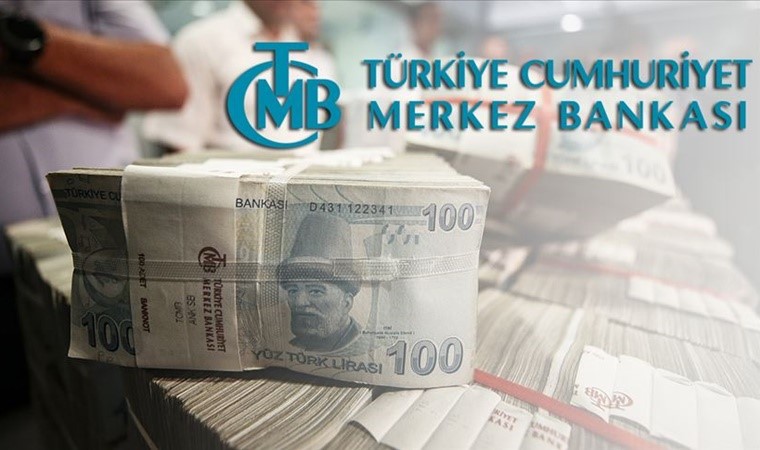
Turkish press forced to admit inflation and TCMB disaster in March 2021[60]
The initially strong economic growth hid the problems that have not been solved – especially those of education. Obligatory education up to the age of 12 was only introduced in 2012, but the range of courses offered has remained the same as it was 150 years ago – a fact made even more paradoxical by the balance between religious and secular schools; This leads to a structural shortage of skilled workers and a negative incentive for initiative: in 2011 the employment rate was 50% and for women only 28%, which is made more difficult by a high level of population growth[61].
In addition, a lack of realignment between the minimum wage and the cost of living, an extremely inadequate tax system, a corrupt and politicized justice system are a toxic mixture that impedes a process of economic consolidation[62]. The internal market costs more than it produces: in 2012, half of Turkish imports were electricity and energy[63]. Erdoğan’s AKP does not deal with the Central Bank (TCMB Türkiye Cumhuriyet Merkez Bankası) to raise or lower interest rates due to inflation, but primarily to attract foreign capital by lowering corporate tax costs foreigners, penalizing workers, leading to more poverty and insecurity[64].
The accumulation of a huge external debt; a 40% annual growth rate of bank loans, which in turn leads to a huge balance of payments deficit; an irrational desire to keep interest rates low[65]; a vertical increase in consumer credit – these are the main ingredients of the crisis. After the national economy’s house of cards collapsed, the Turkish Lira (TRY) fell by a quarter of its value between November 2010 and September 2011, becoming the world’s worst performing currency among developing markets[66]. This leads foreign investors to reduce TRY deposits and force Turkey to finance the current account deficit in dollars[67].
At the same time, Turkey’s aggressive foreign policy is exacerbating tensions in the Middle Eastern market, which is the heart of Ankara’s economy. To avoid recession, Erdoğan orders to cut interest rates instead of changing foreign policy. However, as trade does not improve, this development will lead to a further depreciation of the Turkish lira, a spike in inflation and an increase in household debt[68]. In this situation of dangerous weakness, Erdoğan decides to increase military spending and involve the Turkish army in a series of actions abroad that will worsen the trade balance and increase costs[69].
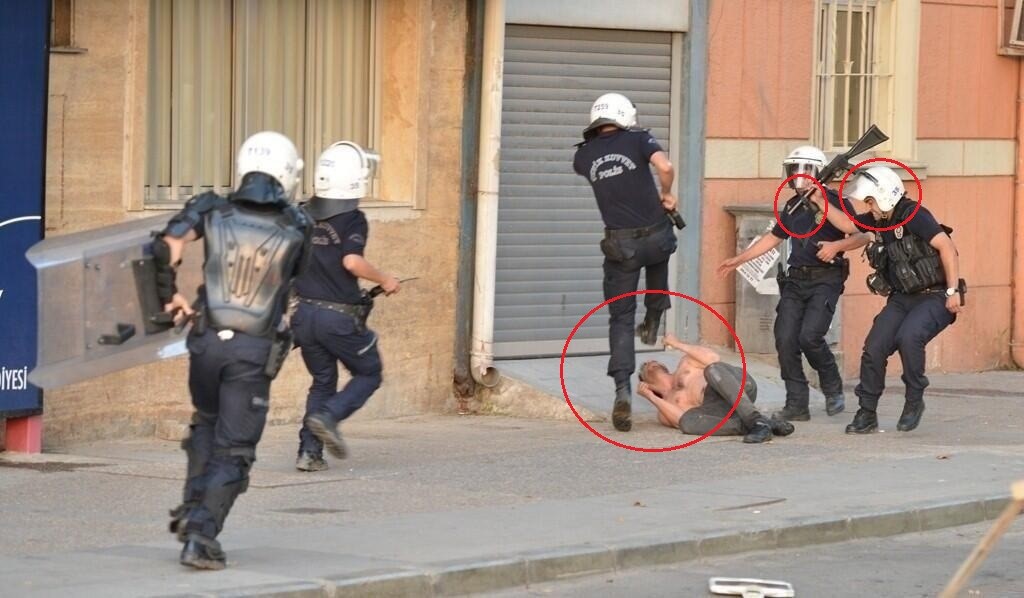
Turkish police in action against isolated and unarmed protesters[70]
From 2014, the increase in jihadist terrorism actions[71] and the bad reputation of the government as well as the decline in exports[72] is a terrible blow to tourism, which only decreased by a million in presence in 2015 and causes a bleeding that continues to this day[73]. The military, realizing that Erdoğan is killing the country, attempts a coup in 2016 – with shameful consequences as it gives the dictator the opportunity to tighten freedom theft laws and leads to the collapse of the stock market because foreign investors leave quickly[74]. The Turkish withdrawal market. Erdoğan reacted as always by tensing his muscles and only received the order from Donald Trump of embargo on steel and aluminum made in Turkey: a terrible blow[75] to which Erdoğan responded with a restrictive trade policy that took place in a situation of collapse of foreign exchange reserves (-175% between 2014 and 2019[76]) and lead to a very severe recession which will then be aggravated by the pandemic.
Instead of questioning his own decisions, the president blames the leaders of the central bank: in July 2019, Erdoğan dismisses the governor of the TCMB, Murat Cetinkaya, in office since 2016, four years before the end of his mandate without giving n any reason[77]. The questionable choice undermines the independence of a key figure in the economy. The post will be assigned to his deputy Murat Uysal, more accommodating with the monetary policy lines imposed by Erdoğan[78]. But that is not enough, because this policy is wrong and does not stop the collapse[79]: in November even Uysal will be replaced, this time by the former Minister of Finance Naci Ağbal[80].
Ağbal achieves some success by increasing the value of TRY[81], but Erdoğan is not happy with this as he raises interest rates above 8% to achieve this result[82]. At the end of March 2021, Agbal was also kicked out, and his place was taken by Sahap Kavcioglu, a former banker and APK MP who was known for his strong aversion to high interest rates[83]. A choice which clearly corresponds to the thinking of the current Turkish president, but which has so far proved unsuccessful. The new change at the top of TCMB leads to a sudden collapse in the stock market[84].
Now everyone is saying the same thing, but Erdoğan pretends not to hear about it: tourists have to come back because they bring foreign currency with them, because they have to write off billions of dollars of investments in tourism infrastructure that now degenerate into a lack of guests; The consumer credit system, which has put almost all Turkish households in debt far beyond their ability to repay their loans, must be stopped immediately, leading to hunger and bankruptcy. We have to absorb a real estate bubble that is no longer realistic or manageable. Military spending must be reduced; The foreign image of the country must be improved: ensuring that there is less violence in the streets, restoring the credibility of democracy and the market – all things obvious, but which mean for Erdoğan that he is close to electoral defeat, which, if democratically elected, would henceforth be inevitable[85].
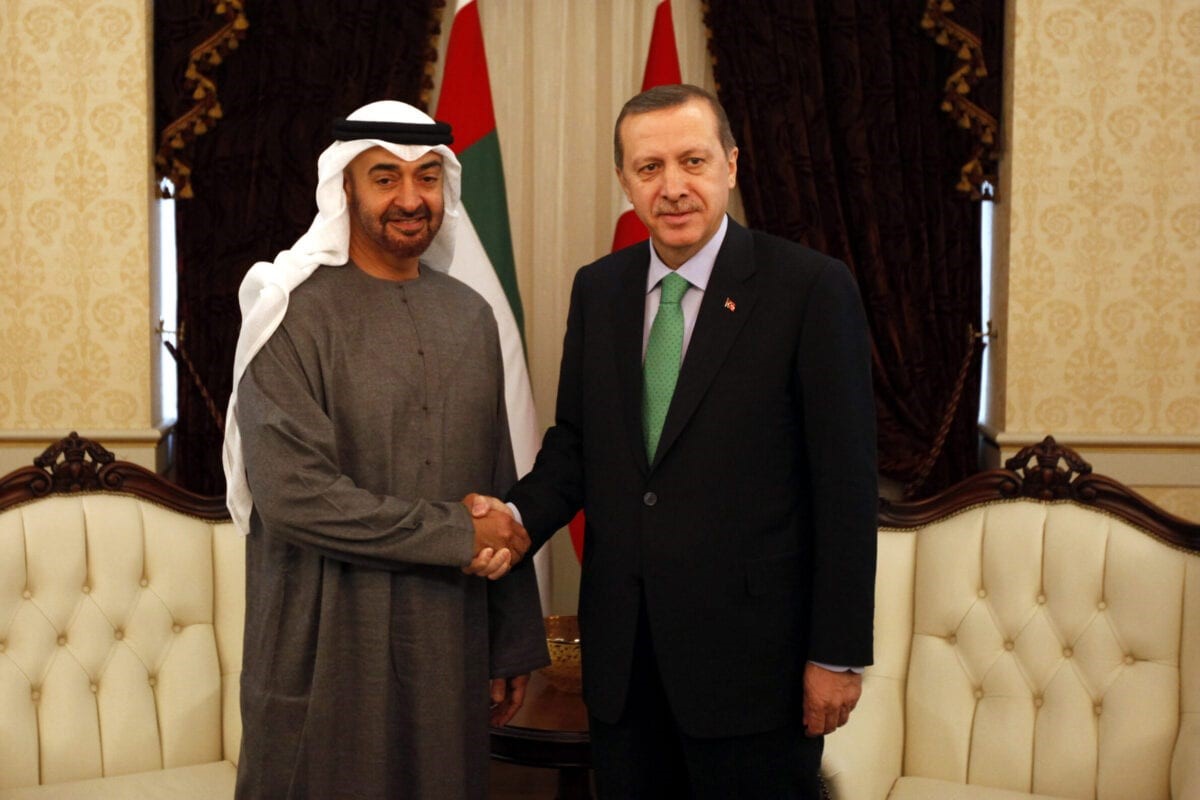
Mohammed Bin Zayed Al Nahyan and Tayyip Erdoğan during one of the last friendship meetings in February 2012[86]
However, the alternative is not tempting. There is a great risk of failure in the medium term: the state, which can no longer pay salaries[87]. The same goes for the Çalık Holding group, hitherto subsidized by the state, which is owned by the family of the president (son-in-law Berat Albayrak) and never generated a penny of real income[88].
Erdoğan’s first step is surprising: after ten years of diplomatic, economic war and military threats between Turkey and the United Arab Emirates[89], international analysts report in January and February 2021 that the hostile attitude between the two countries is in changing[90]. In March, Turkish Foreign Minister Mevlüt Çavuşoğlu admitted that diplomacy had resumed relations between Ankara and Cairo – in direct contradiction to the protections that the Muslim Brotherhood[91], Hezbollah and the Palestinian[92] cause have granted until present.
After Erdoğan received the promise of diplomatic and commercial support from the Alliance of Gulf States, he began to build up his muscles again: on March 19, 2021, President Erdoğan issued a decree to withdraw Turkey from the Convention of the Council of Europe on Preventing and Combating Violence Women and Domestic Violence, known as the Istanbul Convention: a revolutionary treaty strongly supported by the women’s rights movement in Turkey[93].
In a few hours the very first measures of the AKP government after the 2002 vote, such as the abolition of state security courts[94], the abolition of the death penalty[95], the processes of integration and mitigation of extremism religious rights, the granting of greater cultural rights to the Kurdish minority and the broad path of liberal reforms[96], are revoked.
This means the expansion of the powers of the secret service (Milli İstihbarat Teşkilatı, MİT), which has allowed MIT officials to access personal data without a court ruling since 2014 – and to grant their representatives immunity from prosecution for violation of statutory instruments or the law[97] – this means the end of any democratic state. In addition, the government’s full control over social media and websites, as well as the imprisonment of the press for leaking nasty information[98], will be strengthened.
The same goes for the 2015 law, which provides for a strengthening of the powers of the police in cases of indiscriminate use of weapons and wiretapping, arrests, torture and beatings during public demonstrations of dissent[99]. The same provision allows police to remove online content and freeze internet accounts, and gives the president a discretionary fund to fund covert operations[100].
The hard fist after the failed coup of 2016
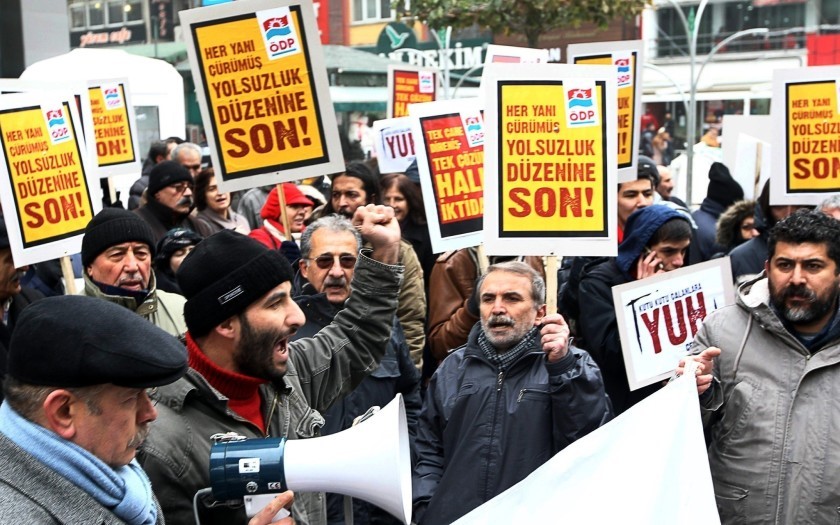
Protesters in Istanbul against Prime Minister Erdoğan’s government after one of the many corruption cases that have gripped the AKP exploded [101]
The real repressive and anti-democratic turn came after the 2016 coup – a failed military coup that killed 290 people and injured 1,440 others. This becomes an excellent alibi for cleaning up adversaries by state emergency law: 131 news agencies are closed, including 45 newspapers, 16 TV stations, three news agencies, 23 radio stations, 15 magazines and 29 publishers[102]. More than 110,000 people are handcuffed, including 50,000 accused, while the rest are arrested without charge – including 7,400 soldiers, 10,000 police officers, 168 civil servants and 2,575 judges[103].
The constitutional reform, adopted in a controversial referendum[104] with 54.1% of the vote in April 2017, transfers most of the powers of the Prime Minister to the President, whose power becomes autocratic: he is now executive director, head of the State, it appoints the ministers, establishes the budget, elects the judges and promulgates the laws by decree and is the only one able to declare the state of emergency[105]. The consequences are tragic and describe the birth of the current dictatorship.
- In June 2017, Enis Berberoğlu, a Turkish politician and journalist from the Republican People’s Party CHP, was sentenced by the court to 25 years in prison for spying for showing a video to foreign journalists showing Turkish intelligence services carrying weapons in Syria[106].
- In November 2017, the government banned all events defending the rights of homosexual, bisexual and transgender people in Ankara and then throughout the country[107].
- In March 2018, the Turkish court sentenced 14 journalists and employees of the Turkish daily Cumhuriyet to very heavy prison terms for showing sympathy for Fetullah Gülem[108], Erdoğan’s bitter opponent.
- In July 2018, authorities in nine provinces on the Syrian border stopped registering asylum seekers. The suspension leads to illegal evictions, forced repatriation and denial of health care and education[109].
- Also in the same month, parliament introduced a bill by which the extraordinary powers of the president in the last state of emergency, which officially ended on July 18, 2018, must be finalized[110].
- On September 21, 2018, a demonstration of workers protesting against the poor working conditions was attacked by the police with batons and tear gas: 500 of them were detained for four days to prevent access to lawyers, parliamentarians and members of their families. 24 remain in detention, 19 are released on bail[111].
- On April 24, 2020, Ali Erbaş, an imam of the Directorate of Religious Affairs of Turkey, declared in a sermon that homosexuality and premarital sex are responsible for the spread of AIDS. Some Ankara legal groups and legal associations criticize: Several senior Turkish officials, including President Erdoğan, condemn the Ankara Bar for criticizing the sermon after expressing their support for Erbaş’s remarks[112].
- In July 2020, Human Rights Watch reported on beatings and other ill-treatment inflicted on at least 14 people in six incidents in Diyarbakır and Istanbul in the past two months[113]. On September 11, 2020, Turkish police raided 47 lawyers at their homes, charged them with terrorism and ransacked their offices[114].
- The Attorney General of the Turkish Court of Appeal announces the opening of proceedings to ban the pro-Kurdish party HPI (People’s Democratic Party)[115] and confirms Erdoğan’s decision to expel an HDP member from parliament[116]. The Supreme Court has dismissed the party’s motion to ban the party for “procedural flaws” for the time being[117].
Gezi Park and violence as a political program
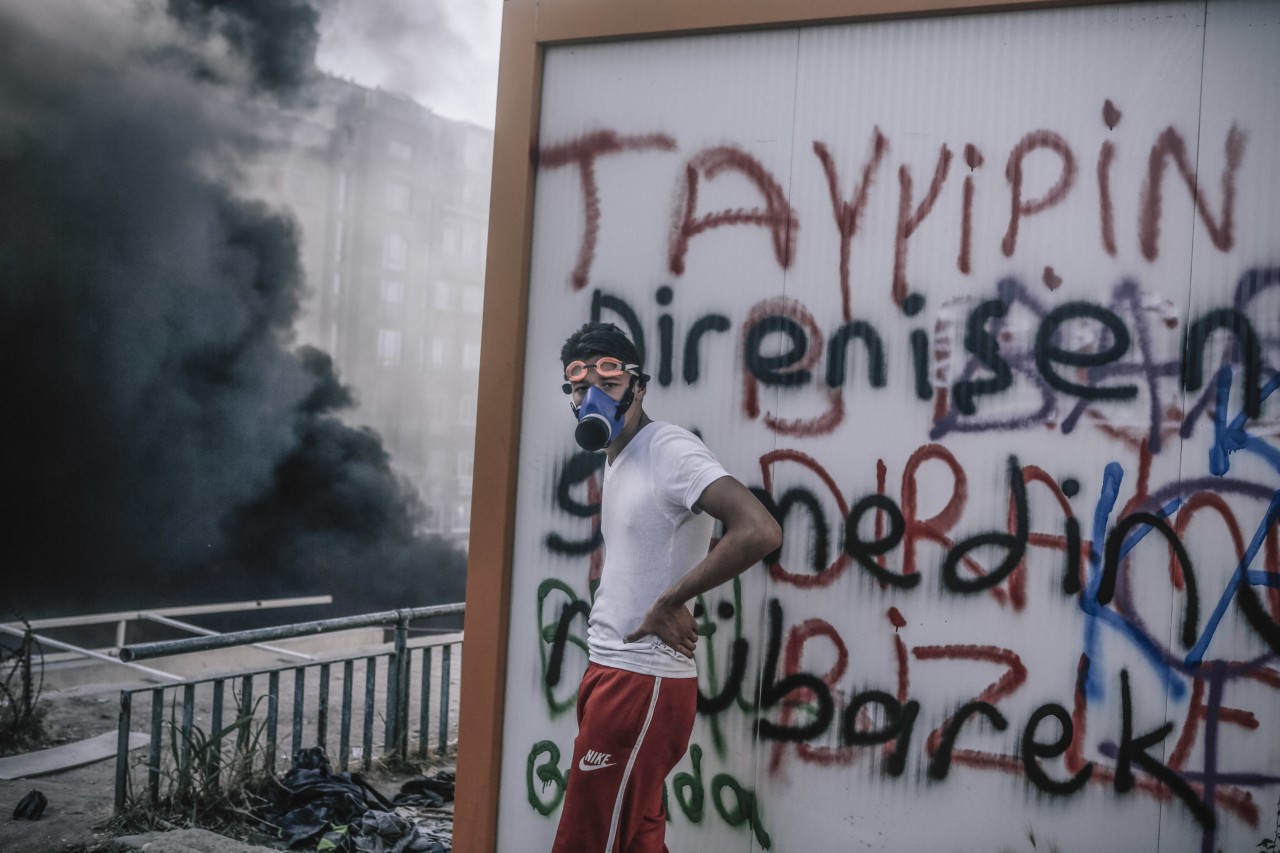
Scenes of the 2013 events for Gezi Park[118]
On May 27, 2013, representatives of Taksim Solidarity – a coalition of NGOs, party groups and professional associations – will meet in Gezi Park[119]. The small protest is motivated by the rejection of a plan that would effectively destroy the park, one of the last green spaces in central Istanbul: the reconstruction of the 19th century Ottoman barracks, Topçu Kışlası, a shopping mall and a mosque is expected[120]. The next day, a group of environmental protesters staged a peaceful sit-in in Gezi Park. Police intervened with tear gas and pepper spray to disperse the protesters, which outraged the public[121].
On May 30, thanks mainly to social media, accounts of the previous day’s events spread and the protest spread to more and more participants, to which the police responded with tear gas, beatings and tents[122]. In a few days, tens of thousands of demonstrators will take to the streets of major cities in Turkey. Hundreds of thousands of demonstrators in almost all of Turkey’s 81 provinces joined the “Gezi Park protests” in mid-June[123]. Erdoğan warns: We will be tougher and “beating pots and pans in solidarity with the protesters is also considered a crime”[124].
In the meantime, journalists covering the protests, doctors treating the injured and lawyers supporting the protesters have been arrested. Intimidation and threats target entrepreneurs who offer protection to protesters fleeing police violence by opening their doors to them, and condemnation against social media such as Twitter and Facebook, which carry messages from protesters and their supporters[125]. Amnesty International reports the use of sharp bullets and sexual abuse by police against some of the women who demonstrated[126].
On June 23, the Home Office reported the arrest of around 4,900 people among the protesters, and at the end of August, police continued to arrest, interrogate and torture the people arrested during protests[127]. On July 15, the Turkish Medical Association reported that as of July 10, more than 8,000 people had been injured. Five deaths were reported in late August[128]. Something is happening anyway: The Gezi Park shopping center project is scrapped, but Istanbul’s government and mayor continue to design new projects for Taksim Square – a concrete pour next to which a new mosque will be built[129].
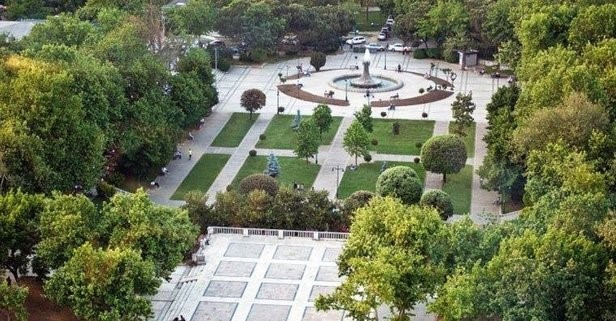
Gezi Park, empty, the morning after the transfer of his property [130]
Gezi Park is of course a symbolic case. This is symbolic of Erdoğan’s strong gentrification process, but also his insane theory that wild construction will strengthen the national economic system because so many wealthy foreigners will come and buy houses in Turkey – a strategy that has not worked[131]. For this reason, when the president realizes the symbolic value of the moat in the park, he will transfer the ownership of the Istanbul City Hall to the Sultan Bayezid Foundation[132] and arouse the ire of all, including Mayor Ekrem İmamoğlu[133].
Seeing the citizens getting angry, Erdoğan increases the pressure and decides to transfer the ownership of more than a thousand historical monuments in Istanbul[134] from the city to that of the General Directorate of Turkish State Foundations[135] (Vakiflar Genel Müdürlüğü[136]), and even begins to demolish it from some of those – those related to the Christian faith[137]. Instead, Gezi Park will be assigned to the Sultan Beyazıt Hanı Veli Hazretleri Vakfı’nın Foundation, to which theişli Etfal Hospital, Vefa High School and the historic Sait Halim Paşa building will also be transferred[138].
But that doesn’t change anything. Gezi Park was the first opportunity for Turkey to come together in the square and fight for its rights, not only for the desperate fifties because they lose their jobs, their freedom, their hope, but also for the 20 years who are satiated with enthusiasm and who have proven to be similar to each other – beyond any attempt by the regime to divide Turkish society with hateful barriers regarding gender, ethnicity and cultural tastes. There were Turkish and Kurdish environmentalists, secularists and nationalists, atheists and religious, gay boys and veiled girls, Sunnis and Alevis in the square[139]. To show that the Turkish regime is not only a dictatorship, but that it has largely failed to achieve its goal of destroying Turkish society and to achieve its vital, tolerant, curious and inclusive character.
The state’s only response since 2013 has been violence, and Gezi Park has been the source of even more liberal and violent laws. But one only needs to have been to Istanbul, one of the most beautiful cities in the world, to see that life is on fire under the ashes and that the days of the bloody Erdoğan regime are not endless.
[1] https://stream24.ilsole24ore.com/video/mondo/erdogan-riceve-von-der-leyen-ma-lei-non-c-e-sedia-d-onore-e-polemica/ADRJfxVB?refresh_ce=1
[2] https://www.businessinsider.in/slideshows/miscellaneous/the-life-of-turkish-president-recep-tayyip-erdogan-who-survived-a-coup-bent-an-entire-nation-to-his-will-and-owned-the-us-over-syria/slidelist/71692869.cms
[3] https://www.tccb.gov.tr/en/receptayyiperdogan/
[4] https://www.insideover.com/indepths/politics/who-is-recep-tayyip-erdogan.html
[5] https://www.bbc.com/news/10176915 ; https://www.fanpage.it/esteri/chi-e-erdogan-il-sultano-di-ankara-che-ha-invaso-la-siria-e-guarda-alla-libia/
[6] https://www.tccb.gov.tr/en/receptayyiperdogan/biography/
[7] https://www.bbc.com/news/blogs-trending-36436200
[8] https://www.bbc.com/news/blogs-trending-36436200
[9] https://www.tccb.gov.tr/en/receptayyiperdogan/biography/
[10] https://www.ibs.it/art-of-political-storytelling-why-libro-inglese-philip-seargeant/e/9781350107380 “The Art of Political Storytelling: Why Stories Win Votes in Post-truth Politics” – Philip Seargeant – 2020 – page 55.
[11] https://www.tccb.gov.tr/en/receptayyiperdogan/biography/
[12] https://www.tandfonline.com/doi/pdf/10.1080/19370679.2015.12023269 Journal of Middle Eastern and Islamic Studies (in Asia) “National Outlook Movement” in Turkey: A Study on the Rise and Development of Islamic Political
Parties” – Chen YANG & Changgang GUO – pag. 29
[13] https://www.reuters.com/article/uk-turkey-trial-1980-idUKBRE8330F320120404
[14] http://countrystudies.us/turkey/83.htm
[15] https://www.aa.com.tr/en/turkey/turkey-remembers-bloody-1980-coup-40-years-ago/1970965
[16] https://www.eastjournal.net/archives/47811
[17] https://www.amazon.it/Turkey-Americas-Forgotten-Dankwart-Rustow/dp/087609065X “Turkey, America’s Forgotten Ally”– Dankwart A. Rustow New York: Council on Foreign Relations, 1987 – Pg. 78
[18] http://archive.ipu.org/parline-e/reports/arc/2323_91.htm
[19] https://www.globalsecurity.org/military/world/europe/tu-political-party-rp.htm
[20] https://sites.google.com/view/spistoriapoliticainformazione/le-mille-e-una-notte/1997-il-golpe-postmoderno-in-turchia
[21] https://sites.google.com/view/spistoriapoliticainformazione/le-mille-e-una-notte/1997-il-golpe-postmoderno-in-turchia
[22] https://www.setav.org/en/turkey-legacy-of-1997-post-modern-coup-against-erbakan/
[23] https://www.biography.com/political-figure/recep-tayyip-erdogan; https://www.nytimes.com/1998/04/22/world/istanbul-mayor-an-islamist-is-given-10-month-jail-term.html
[24] https://www.washingtoninstitute.org/policy-analysis/november-2002-elections-and-turkeys-new-political-era
[25] https://www.theguardian.com/world/2002/nov/04/2
[26] https://www.britannica.com/biography/Recep-Tayyip-Erdogan
[27] https://www.britannica.com/biography/Abdullah-Gul
[28] https://www.dw.com/en/turkeys-ruling-akp-party-has-history-of-links-to-islamist-groups/a-19480952
[29] https://www.europarl.europa.eu/summits/hel1_en.htm
[30] https://www.osw.waw.pl/en/publikacje/osw-commentary/2013-11-06/turkeys-economy-a-story-success-uncertain-future
[31] https://www.everycrsreport.com/reports/RS21355.html
[32] https://www.babilonmagazine.it/turchia-erdogan-neo-ottomanesimo/
[33] https://journals.openedition.org/diacronie/2545#tocto1n5
[34] https://fanack.com/turkey/faces/recep-tayyip-erdogan/
[35] https://fanack.com/turkey/faces/recep-tayyip-erdogan/
[36] https://www.osw.waw.pl/en/publikacje/osw-commentary/2013-11-06/turkeys-economy-a-story-success-uncertain-future
[37] https://www.osw.waw.pl/en/publikacje/osw-commentary/2013-11-06/turkeys-economy-a-story-success-uncertain-future
[38] https://www.osw.waw.pl/en/publikacje/osw-commentary/2013-11-06/turkeys-economy-a-story-success-uncertain-future
[39] http://www.ansamed.info/ansamed/it/notizie/rubriche/politica/2014/11/19/gas-ministro-ciproda-turchia-provocazione-ma-eni-va-avanti_f710c28b-4a30-4081-bd8d-3b1aade302b6.html
[40] https://www.sieps.se/en/publications/2004/the-political-dynamics-of-turkish-accession-to-the-eu-a-european-success-story-or-the-20049/Sieps-2004-9.pdf?
[41] https://www.consilium.europa.eu/ueDocs/cms_Data/docs/pressData/en/ec/83201.pdf
[42] https://www.mfa.gr/images/docs/kypriako/ankara_agreement_protocole.pdf
[43] https://www.bbc.com/news/world-europe-54504123 ; https://www.reuters.com/article/us-greece-turkey-warships-idUSKCN25A161 ; https://www.balcanicaucaso.org/eng/Areas/Turkey/Greece-and-Turkey-machismo-in-the-eastern-Mediterranean-204699
[44] https://www.newworldencyclopedia.org/entry/Turkish_invasion_of_Cyprus
[45] https://www.refworld.org/docid/3b00f16528.html
[46] https://unficyp.unmissions.org/
[47] https://www.britannica.com/place/Cyprus/Efforts-toward-reunification
[48] https://fas.org/sgp/crs/mideast/R44591.pdf
[49] https://www.un.org/Depts/los/LEGISLATIONANDTREATIES/STATEFILES/CYP.htm
[50] https://www.offshore-energy.biz/eu-sanctions-turkey-for-drilling-offshore-cyprus/
[51] https://greekcitytimes.com/2021/03/09/ankara-athens-ships-kastellorizo/ ; https://www.bbc.com/news/world-europe-53497741
[52] https://www.reuters.com/article/us-cyprus-north-election-result-idUSKBN2730PP
[53] https://sicurezzainternazionale.luiss.it/2020/10/01/vertice-ue-la-posizione-cipro-la-turchia-ostacola-negoziati/
[54] https://www.bloomberg.com/news/articles/2020-09-10/eu-efforts-to-influence-belarus-held-up-by-turkey-dispute
[55] https://www.destatis.de/EN/Themes/Society-Environment/Population/Migration-Integration/Tables/foreigner-gender.html ; https://www.dw.com/en/german-turks-still-rooted-in-the-east-study/a-44799929
[56] https://sicurezzainternazionale.luiss.it/2020/10/01/vertice-ue-la-posizione-cipro-la-turchia-ostacola-negoziati/
[57] https://www.spiegel.de/consent-a-?targetUrl=https%3A%2F%2Fwww.spiegel.de%2Fpolitik%2Fausland%2Fruestungsexporte-thyssen-krupp-soll-u-boote-an-ankara-liefern-a-1206704.html&ref=https%3A%2F%2Fwww.google.com%2F
[58] https://epthinktank.eu/2020/12/15/outcome-of-the-meetings-of-eu-leaders-on-10-and-11-december-2020/
[59] https://www.ab.gov.tr/press-release-regarding-the-conclusions-of-the-eu-council-meeting-of-10-11-december-2020-republic-of-turkey-ministry-of_52318_en.html
[60] https://www.cumhuriyet.com.tr/haber/ekonomistlerin-politika-faizi-gorusu-ne-tcmb-degisime-gidecek-mi-1807426
[61] https://www.osw.waw.pl/en/publikacje/osw-commentary/2013-11-06/turkeys-economy-a-story-success-uncertain-future
[62] https://www.osw.waw.pl/en/publikacje/osw-commentary/2013-11-06/turkeys-economy-a-story-success-uncertain-future
[63] https://www.osw.waw.pl/en/publikacje/osw-commentary/2013-11-06/turkeys-economy-a-story-success-uncertain-future
[64] https://www.imf.org/external/pubs/ft/scr/2012/cr12339.pdf
[65] https://foreignpolicy.com/2018/05/25/erdogan-is-a-mad-economist-and-turkey-is-his-laboratory/
[66] https://www.meforum.org/3134/turkey-economic-miracle
[67] https://www.meforum.org/3134/turkey-economic-miracle
[68] https://www.meforum.org/3134/turkey-economic-miracle
[69] https://www.britannica.com/event/Syrian-Civil-War
[70] https://imgur.com/gallery/jnFz7Kz/comment/63867129
[71] https://www.crisisgroup.org/timeline-isis-attacks-turkey-and-corresponding-court-cases
[72] https://www.csis.org/analysis/turkish-economy-2015-0#:~:text=Foreign%20direct%20investment%20(FDI)%20climbed,than%20doubled%20to%2011.5%20billion.
[73] https://www.csis.org/analysis/turkish-economy-2015-0#:~:text=Foreign%20direct%20investment%20(FDI)%20climbed,than%20doubled%20to%2011.5%20billion.
[74] https://st.ilsole24ore.com/art/mondo/2016-07-18/sull-economia-turca-allarme-instabilita-221954.shtml?uuid=ADhAKYu
[75] https://www.cnbc.com/2018/08/10/trump.html
[76] https://www.ilsole24ore.com/art/l-avvitamento-crisi-turca-e-mosse-dubbie-banca-centrale-ABtK6VsB
[77] https://www.bbc.com/news/world-europe-48891658
[78] https://www.bbc.com/news/world-europe-48891658
[79] https://www.dw.com/en/turkish-lira-under-increasing-pressure/a-55516956
[80] https://www.reuters.com/article/uk-turkey-cenbank-governor/turkeys-erdogan-ousts-central-bank-governor-after-steep-lira-slide-idUSKBN27N025
[81] https://www.ilfattoquotidiano.it/2021/03/22/turchia-lira-a-picco-dopo-la-cacciata-del-governatore-della-banca-centrale-naci-agbal-e-il-quarto-cambio-in-meno-di-due-anni/6141452/
[82] https://www.cnbc.com/2021/03/20/erdogan-sacks-turkeys-hawkish-central-bank-governor-after-rate-hike.html
[83] https://www.reuters.com/article/turkey-cenbank-investors-int/turkeys-new-central-bank-head-promises-tight-policy-sources-say-idUSKBN2BO63S
[84] https://www.ilfattoquotidiano.it/2021/03/22/turchia-lira-a-picco-dopo-la-cacciata-del-governatore-della-banca-centrale-naci-agbal-e-il-quarto-cambio-in-meno-di-due-anni/6141452/
[85] https://ilmanifesto.it/crisi-turca-il-sultano-e-senza-una-lira/
[86] https://www.middleeastmonitor.com/20210107-uae-turkeys-number-one-trade-partner-in-region/
[87] https://www.editorialedomani.it/politica/mondo/crollo-lira-turca-ankara-erdogan-crisi-pagamenti-h7l61njd
[88] https://www.reuters.com/article/us-turkey-currency-albayrak-idUSKBN1L01V1 ; https://ilmanifesto.it/crisi-turca-il-sultano-e-senza-una-lira/
[89] https://ecfr.eu/publication/useful-enemies-how-the-turkey-uae-rivalry-is-remaking-the-middle-east/
[90] https://www.dailysabah.com/opinion/columns/end-of-orb-alliance-a-change-in-turkey-gulf-ties ; https://www.trtworld.com/opinion/the-uae-wants-to-normalise-relations-with-turkey-is-it-genuine-43251 ; https://www.middleeastmonitor.com/20210119-turkey-and-the-uae-move-to-improve-relations/
[91] https://dctransparency.com/de/can-turkey-break-with-the-muslim-brotherhood/
[92] https://www.worldpoliticsreview.com/articles/29521/turkey-eez-diplomacy-leads-to-a-thaw-in-turkey-egypt-relations ; https://carnegieendowment.org/2021/03/19/will-page-turn-on-turkish-egyptian-relations-pub-84124
[93] https://www.resmigazete.gov.tr/eskiler/2021/03/20210320-49.pdf ; https://www.hrw.org/news/2021/03/24/turkey-erdogans-onslaught-rights-and-democracy
[94] https://www.ab.gov.tr/files/pub/prt.pdf art.143
[95] https://www.irishtimes.com/news/turkish-parliament-to-abolish-death-penalty-1.1090721
[96] https://rm.coe.int/16806db702
[97] https://www.loc.gov/law/help/national-security-law/turkey.php
[98] https://www.loc.gov/law/help/national-security-law/turkey.php
[99] https://dergipark.org.tr/tr/download/article-file/361075
[100] https://www.loc.gov/law/help/national-security-law/turkey.php
[101] https://www.latimes.com/world/la-xpm-2013-dec-23-la-fg-wn-turkey-corruption-erdogan-unrest-20131223-story.html
[102] https://www.hrw.org/report/2016/12/15/silencing-turkeys-media/governments-deepening-assault-critical-journalism
[103] https://edition.cnn.com/2017/04/14/europe/turkey-failed-coup-arrests-detained/index.html
[104] https://www.dw.com/en/osce-turkey-referendum-contested-on-an-unlevel-playing-field/a-38453816
[105] https://fanack.com/turkey/governance-and-politics-turkey/
[106] https://www.theguardian.com/world/2017/jun/14/turkish-opposition-politician-jailed-spying-charges-enis-berberoglu
[107] https://www.politico.eu/article/turkish-authorities-ban-lgbt-events-in-ankara/
[108] https://www.hrw.org/news/2018/04/27/turkey-journalists-convicted-doing-their-jobs
[109] https://www.hrw.org/news/2018/07/16/turkey-stops-registering-syrian-asylum-seekers
[110] https://www.hrw.org/news/2018/07/20/turkey-normalizing-state-emergency
[111] https://www.hrw.org/news/2018/09/21/construction-workers-turkeys-new-airport-jailed-protesting-work-conditions
[112] https://www.hrw.org/news/2020/05/01/turkey-criminal-case-opposing-homophobic-speech
[113] https://www.hrw.org/news/2020/07/29/turkey-police-watchmen-involved-torture-ill-treatment
[114] https://www.hrw.org/news/2020/09/16/turkey-lawyers-arrested-terror-probe
[115] https://www.bbc.com/news/world-europe-56438070
[116] https://www.turkishminute.com/2021/03/19/istanbul-mayor-slammed-closure-case-deputys-expulsion-in-call-to-party-chair/
[117] https://www.aljazeera.com/news/2021/3/31/turkeys-high-court-rejects-bid-to-close-pro-kurdish-party
[118] https://www.magnumphotos.com/newsroom/politics/emin-ozmen-turkey-gezi-park-protests-5-year-anniversary/
[119] https://link.springer.com/content/pdf/bbm%3A978-1-137-41378-9%2F1.pdf
[120] https://www.refworld.org/pdfid/524eac5b4.pdf
[121] https://link.springer.com/content/pdf/bbm%3A978-1-137-41378-9%2F1.pdf
[122] https://architizer.com/blog/inspiration/industry/the-istanbul-protests-and-the-future-of-public-space/
[123] https://www.refworld.org/pdfid/524eac5b4.pdf
[124] https://www.amnesty.org/download/Documents/12000/eur440222013en.pdf
[125] https://www.refworld.org/pdfid/524eac5b4.pdf
[126] https://www.bbc.com/news/world-europe-24361082
[127] https://www.amnesty.org/download/Documents/12000/eur440222013en.pdf
[128] https://www.amnesty.org/download/Documents/12000/eur440222013en.pdf
[129] https://kaleydoskop.it/spazi/piazza-taksim-e-il-ripensamento-dello-spazio-pubblico/
[130] https://www.takvim.com.tr/guncel/2021/03/22/vakiflar-genel-mudurlugunden-gezi-parkinin-devrine-iliskin-son-dakika-aciklamasi
[131] https://nextcity.org/features/view/Istanbul-building-boom-gentrification
[132] https://ilerihaber.org/icerik/ibb-baskani-imamoglu-gezi-parki-icin-davamizi-baslatiyorum-124332.html
[133] https://currently.att.yahoo.com/att/istanbul-municipality-says-challenge-gezi-140309541.html
[134] https://bianet.org/english/culture/241230-ministry-transfers-more-than-1-000-historic-properties-to-defunct-ottoman-era-foundations
[135] https://www.birgun.net/haber/gezi-parki-nin-devredildigi-vakif-arsiv-vakfi-cikti-338807
[136] https://www.vgm.gov.tr/ ; https://www.takvim.com.tr/guncel/2021/03/22/vakiflar-genel-mudurlugunden-gezi-parkinin-devrine-iliskin-son-dakika-aciklamasi
[137] https://www.hurriyet.com.tr/yazarlar/yalcin-bayer/yeter-ki-osmanli-olsun-41770230?sessionid=2
[138] https://www.birgun.net/haber/gezi-parki-nin-devredildigi-vakif-arsiv-vakfi-cikti-338807
Leave a Reply